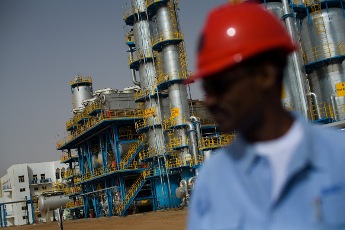China, Sudan agree to increase oil production – officials
November 10, 2012 (KHARTOUM) – Sudan and China have agreed to work towards increasing the former’s oil production and boosting cooperation in the field of mining, officials said.

According to a bulletin by the Sudanese ministry of oil, the meeting discussed a number of common interests as well as preparations to resume exportation of South Sudan oil via Sudan as per a deal signed between the two neighbours on 27 September.
Sudan’s oil production slumped to 120,000 barrels after the East African country lost three quarters of its previous production figure to South Sudan when the latter seceded to form an independent state in July last year. Land-locked South Sudan halted oil production in January this year following a bitter row with Sudan over transit fees.
After the two countries fought a brief war in April around border oil fields, however, they resumed talks and managed to trash out a deal whereby Juba will pay transit fees of about $9.10 and $11 a barrel as well as $3.08 billion in assistance to help Sudan overcome the loss of oil.
The Sudanese minister said that the wholesale implementation the deals signed with South Sudan, which include security and border demarcation, will ensure resumption of oil operations, stressing that the provision of security and sustainability of peace is critical.
For his part, the Chinese official said that his country’s relations with Sudan will remain solid due to continued cooperation.
Sudan says that resumption of oil operations hinge on South Sudan’s implementation of a deal to secure the 1800-km borders between the two countries through the operationalization of a demilitarized buffer zone and cessation of support to rebels in Sudan’s border regions of South Kordofan and Blue Nile.
Al-Jaz told Reuters last month that oil production will reach 150,000 barrels per day (bpd) by the end of 2012 but this figure contrasts with that of the International Monetary Fund (IMF) which projected, in its annual Sudan report earlier this month, that oil production will likely drop by 60 percent in 2012 before starting to increase again.
“[O]wing to waning mature fields (higher quality Nile blend) and other technical production problems, 2012 production is expected to sharply decline by 60 percent to 117 to 120 thousand barrels per day (bpd),” said the IMF report. “Enhanced recovery in existing fields and further exploration will likely help production to increase again starting in 2013, with a peak expected in 2020 at near 240 thousand bpd, before a gradual decline to about 144 thousand bpd begins in 2030”.
Chinese companies dominate the oil sector in both Sudan and South Sudan, and Sudan is had been one of China’s top foreign suppliers of crude oil. Sudan has recently awarded nine exploration blocks to consortia formed by companies from Canada, Brazil and the Middle East.
Sudan is also conducting oil exploration activities in Block 12B southeast of the western region of Darfur, the scene of a nine year conflict between the government and rebel groups. Darfur block will be operated by China’s PetroEnergy.
In a related development, Sudan’s minister of mining Kamal Abdel Latif announced on Saturday that “dozens” of Chinese companies expressed interests in investing in Sudan’s mining business, according to the official news agency SUNA.
Abdel Latif told SUNA that this happened during his participation at the China Mining Conference and Exhibition on November 3-6 in Tianjin, China.
The minister added that Sudan’s participation in the conference is hoped to increase Chino-Sudanese relations in the field of mining and help Sudan benefit from Chinese expertise in developing this sector.
Sudan recently opened its first Gold refinery to boost the quality of the country’s gold exports. Abdel Latif announced last month that 55 companies have been awarded licenses to mine for Gold in the conflict-hit region of Blue Nile but he did not disclose the identity of those companies.
(ST)
